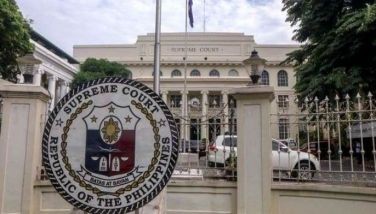First-ever Civil Service Code to professionalize government workforce
May 25, 2002 | 12:00am
Sen. Tessie Aquino-Oreta sought yesterday to professionalize the government’s 1.45-million workforce, curb "midnight appointments," check corruption and improve the delivery of services to the masses through the establishment of the Civil Service Code of the Philippines.
She described the proposed measure as a landmark piece of legislation that would finally codify for the first time in 100 years the various laws relating to civil service.
"At the end of the day, we can expect a streamlined, graft-free and competent bureaucracy. Without a doubt, we will recreate the civil service system once the landmark Civil Service Code is passed," she predicted.
Oreta, chairman of the Senate committee on civil service, said that some of the key provisions of the proposed Code are the grant of leave privileges to solo parents, prohibition of midnight appointments, ban on courtesy resignations and stronger sanctions against nepotism.
Under the proposed Code, denominated as Senate Bill No. 2132, a single parent in government service may be granted parental leave of up to seven days a year, in addition to existing leave privileges.
Solo parents and married mothers who adopt a child below seven years old will also be entitled to an adoption leave of 30 calendar days. Married fathers who adopt a child may enjoy paternity leave benefits of up to seven working days a year.
"The grant of parental leave privileges in government harmonizes the Civil Service Code with the Paternity Leave Act, the Domestic Adoption Act and the Solo Parents’ Act," Oreta said.
The parental leave privileges may be enjoyed by those in government service until their children reach the age of 18 years.
The Senate bill also strengthens the career executive service by applying the merit and fitness principle in the promotion and pay of the country’s 6,044 career executive service officers (CESOs) through a system based on rank rather than position, and a resource listing that will allow the cross posting of CESOs.
Oreta said the measure will enhance the fight against corruption by giving protection to whistleblowers and witnesses to anomalies.
"Temporary employees are also given some measure of protection under the Code," she added.
She explained that the measure prohibits the substitution of casuals during their one-year tenure unless their replacements are fully qualified civil service eligibles.
"The proposed Code expands the grounds for disciplinary action to include sexual harassment, unfair labor and management practices, and unwarranted delay in the release of retirement benefits, among others," Oreta said.
She described the proposed measure as a landmark piece of legislation that would finally codify for the first time in 100 years the various laws relating to civil service.
"At the end of the day, we can expect a streamlined, graft-free and competent bureaucracy. Without a doubt, we will recreate the civil service system once the landmark Civil Service Code is passed," she predicted.
Oreta, chairman of the Senate committee on civil service, said that some of the key provisions of the proposed Code are the grant of leave privileges to solo parents, prohibition of midnight appointments, ban on courtesy resignations and stronger sanctions against nepotism.
Under the proposed Code, denominated as Senate Bill No. 2132, a single parent in government service may be granted parental leave of up to seven days a year, in addition to existing leave privileges.
Solo parents and married mothers who adopt a child below seven years old will also be entitled to an adoption leave of 30 calendar days. Married fathers who adopt a child may enjoy paternity leave benefits of up to seven working days a year.
"The grant of parental leave privileges in government harmonizes the Civil Service Code with the Paternity Leave Act, the Domestic Adoption Act and the Solo Parents’ Act," Oreta said.
The parental leave privileges may be enjoyed by those in government service until their children reach the age of 18 years.
The Senate bill also strengthens the career executive service by applying the merit and fitness principle in the promotion and pay of the country’s 6,044 career executive service officers (CESOs) through a system based on rank rather than position, and a resource listing that will allow the cross posting of CESOs.
Oreta said the measure will enhance the fight against corruption by giving protection to whistleblowers and witnesses to anomalies.
"Temporary employees are also given some measure of protection under the Code," she added.
She explained that the measure prohibits the substitution of casuals during their one-year tenure unless their replacements are fully qualified civil service eligibles.
"The proposed Code expands the grounds for disciplinary action to include sexual harassment, unfair labor and management practices, and unwarranted delay in the release of retirement benefits, among others," Oreta said.
BrandSpace Articles
<
>
- Latest
- Trending
Trending
Latest
Trending
Latest
Recommended




























